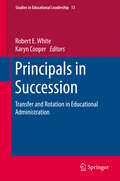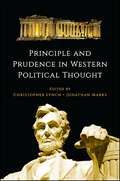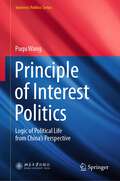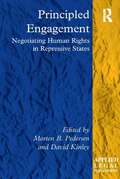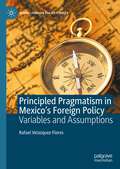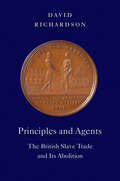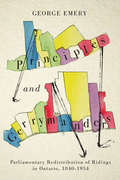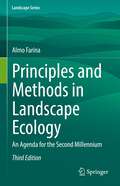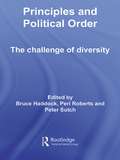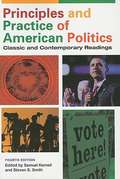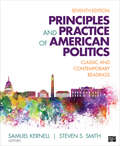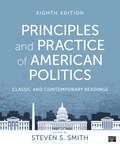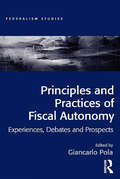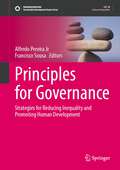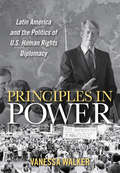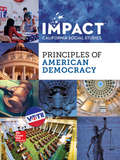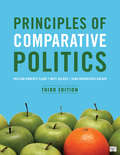- Table View
- List View
Principal Leadership for Parent Engagement in Disadvantaged Schools: What Qualities and Strategies Distinguish Effective Principals? (SpringerBriefs in Education)
by Annemaree Carroll Julie Hodges Linda-Dianne Willis Jenny PoveyThis book presents and theorises research findings into why and how school principals play a critical role in engaging parents and their school communities to enhance student learning and wellbeing. It highlights the imperative of parent engagement as evidenced by clear, consistent findings from research over the last fifty years and government reforms, policies and frameworks internationally and nationally in Australia which have been driven by the weight of this evidence. It focuses on a research project conducted from 2016 to 2017, titled 'Principal leadership for parent-school-community engagement in disadvantaged schools'. This project investigated four principals identified as successful in parent engagement based on findings of state-wide survey research of principals and presidents of parents and citizens’ associations in 2014 in Queensland, Australia. This book offers theoretical and empirical evidence based on literature for the qualities successful principals in parent engagement exhibit, and the strategies they take to achieve parent and community engagement. It shows how the concept of agency as achievement can be used by educators and public policy makers to enable school leaders and teachers to adopt qualities and strategies that will engage parents in their child’s learning and wellbeing, so that improved outcomes for their child and schools can result.
Principals in Succession
by Robert E. White Karyn CooperContributors to this volume examine structures and processes that school boards have in place directly relating to the process of principal or vice-principal succession. As well, they consider the effect that these structures and processes have upon staff and administrators themselves. These contributors investigate policies, procedures and practices that school boards employ in terms of leadership succession, and explore implications of these constructs for the sustainability of school improvement. This volume presents an overview of the process of principal or vice-principal succession, descriptions of school district practices surrounding this process and discussions regarding how succession procedures affect individuals and groups of individuals. This volume also highlights those board policies that incorporate practices used to develop models that support and allow administrators to succeed. It articulates how school leaders and staff members deal with change and improvement efforts in successive schools, as well as how board policies and practices support principals and vice-principals at any stage in the succession process. This volume is useful as a reference guide relating to transfer and rotation procedures in school systems across the nation.
Principle and Prudence in Western Political Thought (SUNY series in the Thought and Legacy of Leo Strauss)
by Christopher Lynch; Jonathan MarksDiscussions of the place of moral principle in political practice are haunted by the abstract and misleading distinction between realism and its various principled or "idealist" alternatives. This volume argues that such discussions must be recast in terms of the relationship between principle and prudence: as Nathan Tarcov maintains, that relationship is "not dichotomous but complementary." In a substantive introduction, the editors investigate Leo Strauss's attack on contemporary political thought for its failure to account for both principle and prudence in politics. Leading commentators then reflect on principle and prudence in the writings of great thinkers such as Homer, Machiavelli, and Hegel, and in the thoughts and actions of great statesmen such as Pericles, Jefferson, and Lincoln. In a concluding section, contributors reassess Strauss's own approach to principle and prudence in the history of political philosophy.
Principle of Interest Politics: Logic of Political Life from China’s Perspective (Interests Politics Series)
by Puqu WangThe book aims to build a political theory of interest politics by adopting an interest-analyzing approach of Marxism to explore the dual characteristics of social interests. Based on the logical start-point, the book unveils the foundations, nature, and characteristics of social-political life such as political power and political right. Then, a systematic research is conducted from perspectives of political behavior, political system, and political culture, following the two logical thread lines as political power and right. Finally, the book sees the analysis of social and political development in accordance with the inter-function of political power and political rights caused by the changes and development of social interests. It is a must-read book for readers interested in the political theory and political development in China.
Principled Engagement: Negotiating Human Rights in Repressive States (Applied Legal Philosophy)
by David Kinley Morten B. PedersenWhat is the best way to promote human rights in grossly repressive states when neither sanctions nor trade and investment have much effect? This book examines the concept of Principled Engagement as an often overlooked alternative strategy for alleviating human rights violations and improving the framework of human rights protection. Beginning with an explanation of the concept and a comparison with the alternatives of Ostracism and Business as Usual, the book argues that Principled Engagement deserves greater attention and explains how it works and what factors contribute to its success or failure. Case studies provide a rare scholarly inquiry into the effectiveness of the basic underlying ideas and analyse and assess specific cases, including from China, Burma, Zimbabwe and Liberia. Written by leading academics and practitioners, the book takes a general, comparative approach to human rights policy that teases out broad lessons about what works. Ultimately, this is a study that challenges scholars and practitioners alike to take a fresh look at how human rights are promoted internationally.
Principled Negotiation and Mediation in the International Arena
by Paul J. ZwierThis book argues that it can be beneficial for the United States to talk with 'evil' – terrorists and other bad actors – if it engages a mediator who shares the United States' principles yet is pragmatic. It shows how the US can make better foreign policy decisions and demonstrate its integrity for promoting democracy and human rights, by employing a mediator who facilitates disputes between international actors by moving them along a continuum of principles, as political parties act for a country's citizens. This is the first book to integrate theories of rule of law development with conflict resolution methods, and it examines ongoing disputes in the Middle East, North Korea, South America and Africa. It draws on the author's experiences with The Carter Center and judicial and legal advocacy training to provide a sophisticated understanding of the current situation in these countries and of how a strategy of principled pragmatism will give better direction to US foreign policy abroad.
Principled Pragmatism in Mexico's Foreign Policy: Variables and Assumptions (Global Foreign Policy Studies)
by Rafael Velazquez-FloresThis book explores Mexico's foreign policy using the ‘principled pragmatism’ approach. It describes and explains main external actions from the country’s independence in the nineteenth century to Andrés Manuel López Obrador’s administration. The principal argument is that Mexico has resorted to principled pragmatism due to geographic, historical, economic, security, and political reasons. In other words, the nation uses this instrument to deal with the United States, defend national interests, appease domestic groups, and promote economic growth.The key characteristics of Mexico’s principled pragmatism in foreign policy are that the nation projects a double-edged diplomacy to cope with external and domestic challenges at the same time. This policy is mainly for domestic consumption, and it is also linked to the type of actors that are involved in the decision-making process and to the kind of topics included in the agenda. This principled pragmatism is related to the nature of the intention: principism is deliberate and pragmatism is forced; and this policy is used to increase Mexico’s international bargaining power.
Principles and Agents: The British Slave Trade and Its Abolition (The David Brion Davis Series)
by David RichardsonA new history of the abolition of the British slave trade &“Easily the most scholarly, clear and persuasive analysis yet published of the rise to dominance of the British in the Atlantic slave trade—as well as the implementation of abolition when that dominance was its peak.&”—David Eltis, co-author of Atlas of the Transatlantic Slave Trade Parliament&’s decision in 1807 to outlaw British slaving was a key moment in modern world history. In this magisterial work, historian David Richardson challenges claims that this event was largely due to the actions of particular individuals and emphasizes instead that abolition of the British slave trade relied on the power of ordinary people to change the world. British slaving and opposition to it grew in parallel through the 1760s and then increasingly came into conflict both in the public imagination and in political discourse. Looking at the ideological tensions between Britons&’ sense of themselves as free people and their willingness to enslave Africans abroad, Richardson shows that from the 1770s those simmering tensions became politicized even as British slaving activities reached unprecedented levels, mobilizing public opinion to coerce Parliament to confront and begin to resolve the issue between 1788 and 1807.
Principles and Gerrymanders
by George EmeryRedistributing electoral ridings alters their number, revises their boundaries, or does both at the same time. Ostensibly, the purpose of redistribution is to adjust parliamentary representation for population changes - the growth or decline of population, or shifts in its territorial distribution and social composition. Before an arm's-length commission, headed by a judge, took control of electoral redistribution in the 1960s, parliament - effectively, the majority party - controlled redistribution, raising the possibility that the governing party would adjust the ridings for its own advantage, a practice known as gerrymandering. Providing detailed analyses of parliamentary redistribution in Ontario that preceded the province's commissioned ridings of the 1960s, George Emery's Principles and Gerrymanders unravels the mechanisms, operational strategies, and exposure to partisanship of parliamentary redistribution and its influence on general election outcomes. Using quantitative research methods, Emery identifies gerrymanders and demonstrates empirically whether or not these worked. He closes with a discussion of the transition to commissioned ridings, what has changed in redistribution, and what continues from the era when parliament redrew ridings. Contextualized with detailed maps and political cartoons, Principles and Gerrymanders is a pioneering study and a major contribution to the literature on Canadian and Ontario political history.
Principles and Gerrymanders: Parliamentary Redistribution of Ridings in Ontario, 1840-1973
by George EmeryRedistributing electoral ridings alters their number, revises their boundaries, or does both at the same time. Ostensibly, the purpose of redistribution is to adjust parliamentary representation for population changes - the growth or decline of population, or shifts in its territorial distribution and social composition. Before an arm's-length commission, headed by a judge, took control of electoral redistribution in the 1960s, parliament - effectively, the majority party - controlled redistribution, raising the possibility that the governing party would adjust the ridings for its own advantage, a practice known as gerrymandering. Providing detailed analyses of parliamentary redistribution in Ontario that preceded the province’s commissioned ridings of the 1960s, George Emery's Principles and Gerrymanders unravels the mechanisms, operational strategies, and exposure to partisanship of parliamentary redistribution and its influence on general election outcomes. Using quantitative research methods, Emery identifies gerrymanders and demonstrates empirically whether or not these worked. He closes with a discussion of the transition to commissioned ridings, what has changed in redistribution, and what continues from the era when parliament redrew ridings. Contextualized with detailed maps and political cartoons, Principles and Gerrymanders is a pioneering study and a major contribution to the literature on Canadian and Ontario political history.
Principles and Methods in Landscape Ecology: An Agenda for the Second Millennium (Landscape Series #31)
by Almo FarinaThis third, thoroughly updated edition of a well received book, presents the most complete collection of theories, paradigms and methods utilized by the landscape sciences. With the introduction of new ecosemiotic concepts and innovative managing procedures, it offers a broad list of ecological, ecosemiotical and cultural tools to investigate, interpret and manage the environmental complexity according to a species-specific individual-based approach. Readers will discover the importance of a landscape perspective to create strategic bridges between science and humanities favored by the holistic sight of sensorial (visual, acoustic, olfactory, tactile, and thermal) “scapes”.Distributed in 10 chapters, the content covers many aspects of the landscape sciences ranging from the description of fundamental theories, principles and models originated by ecological approaches like source-sink models, island biogeography, hierarchical theory and scale. The ecosemiotical approaches like the eco-field model, the ecoscape paradigm, and the general theory of resources are widely described and discussed. A cultural approach to landscape is utilized to focus on the heritage values of territories and their environmental identity. This book, written in an accessible and didactic style, is particularly dedicated to undergraduate and graduate students but also scholars in ecology, agroforestry, urban planning, nature design, conservation and remediation. Land practitioners, farmers and policymakers can use this book as an authoritative guide to better understand the function and role of environmental systems according to a social-economic integrated perspective.
Principles and Political Order: The Challenge of Diversity (Routledge Innovations in Political Theory #Vol. 20)
by Bruce Haddock Peri Roberts Peter SutchAn ideal new multi-disciplinary volume for students and scholars of philosophy, contemporary political theory, and international relations. This volume offers key insights into the work of the chief figures in the contemporary debate surrounding thin universalism and presents a usefully themed contribution to the secondary literature on the work of Onora O’Neill, John Rawls, Michael Walzer, Martha Nussbaum, Stuart Hampshire and others as well as a commentary on contemporary debates surrounding human rights and distributive justice. This new book enables the reader to strongly grasp all the core debates in contemporary normative theory.
Principles and Practice of American Politics: Classic and Contemporary Readings
by Samuel Kernell Steven S. SmithThis reader presents 14 classic and contemporary readings on Federalism to affirmative action, many from the CQ Weekly, providing insights into the major preoccupations, institutions, processes, and news media critics of US government. Suitable as either a core or supplementary course text. Lacks an index. Annotation c. Book News, Inc., Portland, OR (booknews.com)
Principles and Practice of American Politics: Classic and Contemporary Readings
by Samuel Kernell Steven S. SmithCombining timeless readings with cutting-edge articles and essays, Principles and Practice of American Politics, Seventh Edition, enriches your understanding of the American political system by examining the strategic behavior of key players in U.S. politics. This collection of classic and contemporary readings brings concepts to life by providing you with real examples of how political actors are influenced by the strategies of others and are governed by the Constitution, the law, and institutional rules. Carefully edited by award-winning authors Samuel Kernell and Steven S. Smith, each reading is put into context to help you understand how political actions fall within a major national political forum. New to the Seventh Edition Nine new and updated essays encourage you to reflect on the continuing debates over the polarization of the American electorate and Congress, the role of social media and &“fake news&” in influencing public views of politicians and issues, the fragile Trump coalition, the efficacy of polling in tracking public opinion, and other issues more relevant than ever in the wake of the 2016 elections. Additional essays challenge you to think more carefully about alternative institutions and political arrangements. The new essays present institutions of majority rule, the nature of racial discrimination, and the proper role of the court as less settled issues that provide students an opportunity to think through (and discuss) their views on the future direction of American civic life. Each selection is artfully framed by Kernell and Smith&’s contextual headnotes to make them appropriate for classroom use. Original readings written specifically for the volume give the book a coherent treatment of the performance of U.S. political institutions.
Principles and Practice of American Politics: Classic and Contemporary Readings
by Samuel Kernell Steven S. SmithCombining timeless readings with cutting-edge articles and essays, Principles and Practice of American Politics, Seventh Edition, enriches your understanding of the American political system by examining the strategic behavior of key players in U.S. politics. This collection of classic and contemporary readings brings concepts to life by providing you with real examples of how political actors are influenced by the strategies of others and are governed by the Constitution, the law, and institutional rules. Carefully edited by award-winning authors Samuel Kernell and Steven S. Smith, each reading is put into context to help you understand how political actions fall within a major national political forum. New to the Seventh Edition Nine new and updated essays encourage you to reflect on the continuing debates over the polarization of the American electorate and Congress, the role of social media and &“fake news&” in influencing public views of politicians and issues, the fragile Trump coalition, the efficacy of polling in tracking public opinion, and other issues more relevant than ever in the wake of the 2016 elections. Additional essays challenge you to think more carefully about alternative institutions and political arrangements. The new essays present institutions of majority rule, the nature of racial discrimination, and the proper role of the court as less settled issues that provide students an opportunity to think through (and discuss) their views on the future direction of American civic life. Each selection is artfully framed by Kernell and Smith&’s contextual headnotes to make them appropriate for classroom use. Original readings written specifically for the volume give the book a coherent treatment of the performance of U.S. political institutions.
Principles and Practice of American Politics: Classic and Contemporary Readings
by Steven Stanley SmithCombining timeless readings with cutting-edge, current selections, Principles and Practice of American Politics effectively animates today′s institutions and political arrangements in the study of American Government and politics. Each selection is artfully framed by contextual headnotes, and many of the readings are written specifically for the volume. The Eighth Edition includes readings that present institutions of majority rule, the nature of racial discrimination, the proper role of the court, and other issues that provide students an opportunity to think through and discuss their views on the future direction of American civic life.
Principles and Practice of American Politics: Classic and Contemporary Readings
by Steven Stanley SmithCombining timeless readings with cutting-edge, current selections, Principles and Practice of American Politics effectively animates today′s institutions and political arrangements in the study of American Government and politics. Each selection is artfully framed by contextual headnotes, and many of the readings are written specifically for the volume. The Eighth Edition includes readings that present institutions of majority rule, the nature of racial discrimination, the proper role of the court, and other issues that provide students an opportunity to think through and discuss their views on the future direction of American civic life.
Principles and Practice of American Politics: Classic and Contemporary Readings (Second Edition)
by Samuel Kernell Steven S. SmithWe have chosen the readings to serve two audiences. Many instructors will employ Principles and Practice as a supplement to an introductory American politics textbook. For others, this book may constitute the core reading material for the course. For the former, we looked to readings that will animate the institutional processes described in the text. For the latter, we have sought readings that do not assume more than an elementary knowledge of America's government and politics.
Principles and Practices of Fiscal Autonomy: Experiences, Debates and Prospects (Federalism Studies)
by Giancarlo PolaThis century has seen the continuation of long-term trends in the movement of the territorial boundaries of nation states alongside the emergence of new tensions. The repercussions of the Scottish referendum and the heightened urgency of the Catalonia question along with the continued economic problems faced by the Eurozone have given new energy and context to debates on institutional and fiscal autonomy. Assessing the impact of increasing calls for wider fiscal autonomy in the UK, Spain, Switzerland, Argentina, Brazil, Germany, Italy and the USA this volume updates and adds significant new context to the debate. Framing the discussion on fiscal autonomy and drawing out ethical considerations it portrays the problems connected with the devolution of responsibilities and financial resources to sections of the population, sometimes content to be part of a lower layer of government, sometimes aspiring to an asymmetrical position or total independence.
Principles for Governance: Strategies for Reducing Inequality and Promoting Human Development (Sustainable Development Goals Series)
by Alfredo Pereira Francisco SousaThis edited volume provides strategies for reducing inequality and promoting human development through the use of innovative digital technology and the adoption of new bioethical principles for governance. The book is structured around a series of practical proposals which can be adapted to different circumstances, countries, and political systems. Written by an interdisciplinary panel of international researchers and professionals, each chapter details a proposal for a policy—new social technology, Green Deals, robust social assistance—that will move society forward towards a sustainable, digital, and equitable future. Researchers across multiple disciplines--public administration, cognitive technology, E-learning, finance, philosophy of economy, agronomics, forest engineering, bioethics and education—will find this volume a useful reference.
Principles in Power: Latin America and the Politics of U.S. Human Rights Diplomacy (The United States in the World)
by Vanessa WalkerVanessa Walker's Principles in Power explores the relationship between policy makers and nongovernment advocates in Latin America and the United States government in order to explain the rise of anti-interventionist human rights policies uniquely critical of U.S. power during the Cold War. Walker shows that the new human rights policies of the 1970s were based on a complex dynamic of domestic and foreign considerations that was rife with tensions between the seats of power in the United States and Latin America, and the growing activist movement that sought to reform them. By addressing the development of U.S. diplomacy and politics alongside that of activist networks, especially in Chile and Argentina, Walker shows that Latin America was central to the policy assumptions that shaped the Carter administration's foreign policy agenda. The coup that ousted the socialist president of Chile, Salvador Allende, sparked new human rights advocacy as a direct result of U.S. policies that supported authoritarian regimes in the name of Cold War security interests. From 1973 onward, the attention of Washington and capitals around the globe turned to Latin America as the testing ground for the viability of a new paradigm for U.S. power. This approach, oriented around human rights, required collaboration among activists and state officials in places as diverse as Buenos Aires, Santiago, and Washington, DC. Principles in Power tells the complicated story of the potentials and limits of partnership between government and nongovernment actors. Analyzing how different groups deployed human rights language to reform domestic and international power, Walker explores the multiple and often conflicting purposes of U.S. human rights policy.
Principles of American Democracy
by Donald A. Ritchie Richard C. Remy Lena Morreale Scott Lee Arbetman Megan L. HansonPrinciples of Communism
by Friedrich EngelsAn essential principle of Communism is to fight for civil rights.
Principles of Comparative Politics
by Dr William Roberts Clark Matthew R. Golder Sona N. GolderWilliam Roberts Clark, Matt Golder, and Sona Nadenichek Golder’s groundbreaking Principles of Comparative Politics offers the most comprehensive and up-to-date introduction to comparative inquiry, research, and scholarship. In this thoroughly revised Third Edition, readers have an even better guide to cross-national comparison and why it matters. Readers are offered a new intuitive take on statistical analyses and a clearer explanation of how to interpret regression results; a thoroughly-revised chapter on culture and democracy that now includes a more extensive discussion of cultural modernization theory and a new overview of survey methods for addressing sensitive topics; and a revised chapter on dictatorships that incorporates a principal-agent framework for understanding authoritarian institutions. Examples from the gender and politics literature have been incorporated into various chapters and empirical examples and data on various types of institutions have been updated. The book's outstanding pedagogy includes more than 250 tables and figures, numerous photos and maps, end of chapter exercises and problem sets, and a broader set of works cited. New to this Edition A new intuitive take on statistical analyses and a clearer explanation of how to interpret regression results are included. A thoroughly-revised chapter on culture and democracy includes a more extensive discussion of cultural modernization theory and a new overview of survey methods for addressing sensitive topics. A revised chapter on dictatorships incorporates a principal-agent framework for understanding authoritarian institutions. Examples from the gender and politics literature have been incorporated into various chapters. Empirical examples and data on various types of institutions have been updated. Online videos and tutorials guide students through some of the methodological components addressed in the book.
Principles of Comparative Politics
by Dr William Roberts Clark Matthew R. Golder Sona N. GolderWilliam Roberts Clark, Matt Golder, and Sona Nadenichek Golder’s groundbreaking Principles of Comparative Politics offers the most comprehensive and up-to-date introduction to comparative inquiry, research, and scholarship. In this thoroughly revised Third Edition, readers have an even better guide to cross-national comparison and why it matters. Readers are offered a new intuitive take on statistical analyses and a clearer explanation of how to interpret regression results; a thoroughly-revised chapter on culture and democracy that now includes a more extensive discussion of cultural modernization theory and a new overview of survey methods for addressing sensitive topics; and a revised chapter on dictatorships that incorporates a principal-agent framework for understanding authoritarian institutions. Examples from the gender and politics literature have been incorporated into various chapters and empirical examples and data on various types of institutions have been updated. The book's outstanding pedagogy includes more than 250 tables and figures, numerous photos and maps, end of chapter exercises and problem sets, and a broader set of works cited. New to this Edition A new intuitive take on statistical analyses and a clearer explanation of how to interpret regression results are included. A thoroughly-revised chapter on culture and democracy includes a more extensive discussion of cultural modernization theory and a new overview of survey methods for addressing sensitive topics. A revised chapter on dictatorships incorporates a principal-agent framework for understanding authoritarian institutions. Examples from the gender and politics literature have been incorporated into various chapters. Empirical examples and data on various types of institutions have been updated. Online videos and tutorials guide students through some of the methodological components addressed in the book.

